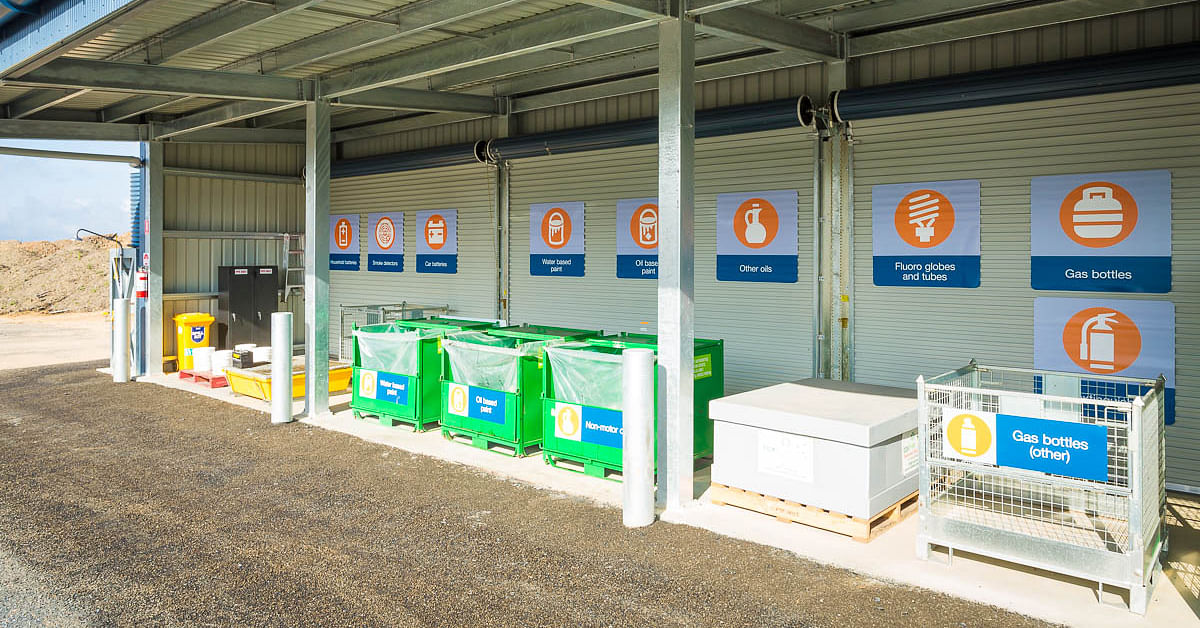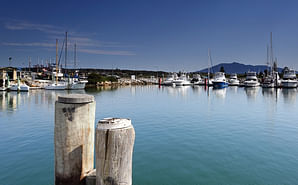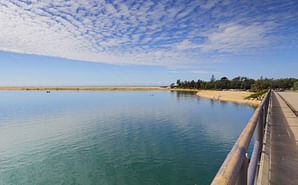Community Recycling Centre
Drop off your household problem waste for free.
Community Recycling Centres (CRCs) collect common household problem wastes that can’t be recycled via council kerbside waste and recycling collection services. Households can drop off problem wastes at these centres year-round, free of charge.

We have 3 CRC options in the Bega Valley
Located at Merimbula Waste & Recycling Centre, our Community Recycling Centre makes it easy to safely and conveniently dispose of problem household wastes.
Items you can drop off for free include:
- Paint
- Gas bottles
- Fire extinguishers
- Motor oil
- Cooking oil
- Car batteries
- Household batteries
- Household items with embedded batteries eg. Electric toothbrush, disposable vapes, rechargable torch
- Smoke detectors
- Fluorescent tubes and globes
The Mobile CRC is TEMPORARILY UNAVAILABLE due to malicious damage caused to it at Wallagoot Waste & Recycling Centre.
Please take your items to Merimbula Community Recycling Centre during operating hours, or store it at home until the Mobile CRC is repaired.
The Mobile CRC travels between Eden, Wallagoot and Bermagui Waste and Recycling Centres on a rotating basis throughout the year.
 The Mobile CRC accepts:
The Mobile CRC accepts:
- Household batteries
- Paint
- Gas bottles
- Fire extinguishers
- Smoke detectors
- Cooking oils
- Fluorescent globes and tubes
When the trailer is full, we take it to the CRC in Merimbula for sorting and processing.
If you have problem waste you need to dispose of but can’t wait for the Mobile CRC, the CRC at the Merimbula Waste and Recycling Centre is open during its normal operating hours.
Check the table below to see when the Mobile CRC will be at a Waste and Recycling Centre near you. Please note, you can only dispose of these items at the Bermagui, Wallagoot and Eden Waste and Recycling Centres when the Mobile CRC is at the site during opening hours.
| Month | Waste and Recycling Centre location |
|---|---|
| January | Eden |
| February | Wallagoot |
| March | Bermagui |
| April | Eden |
| May | Wallagoot |
| June | Bermagui |
| July | Eden |
| August | Wallagoot |
| September | Bermagui |
| October | Eden |
| November | Wallagoot |
| December | Bermagui |
Community Recycling Stations are a free and convenient way to dispose of small household problem waste.
 Each Recycling Station accepts:
Each Recycling Station accepts:
- Household batteries including AAA, AA, C and D alkaline batteries (NO lithium batteries)
- Home printer cartridges, including Brother, Canon, Cartridge World, Epson, HP and Kyocera
- Smoke detectors (batteries removed and recycled separately)
- Mobile phones, chargers and accessories
To reduce the risk of fires, please tape the terminals of your batteries using clear sticky tape before you drop them off.
Only small quantities are accepted at the CRSs per person per visit, for example a handful or two of alkaline batteries, a couple of smoke detectors and printer cartridges, or a few mobile phones and accessory items. This is to make sure the units remain safe and operational for everyone.
Community Recycling Stations can be found at Council’s four Library locations, and can be accessed during library opening hours.
- Bega Library - Zingel Place, Bega.
- Bermagui Library - Bermagui Community Centre, Bunga Street, Bermagui.
- Eden Library – Corner of Mitchell and Imlay Streets, Eden.
Tura Library - Tura Marrang Library and Community Centre, Tura Beach Drive, Tura Beach.
Embedded Battery Recycling
The CRC at the Merimbula Waste and Recycling Centre can now accept items with embedded batteries for FREE recycling in a two year trial supported by the NSW EPA.
Embedded batteries are those that cannot easily be removed from common household items like electric toothbrushes, wireless headphones, rechargable vacuum cleaners, rechargable torches, single-use vapes, cordless hair clippers or shavers etc. They create a serious fire hazard in household bins, waste collection trucks and at our landfill. This two year collection trial allows us to accept these items at the Merimbula CRC for safe recycling.
- Common items that are accepted at the Merimbula CRC includes:
- Bluetooth speakers and headphones
- Electric toothbrushes
- E-scooters, e-bikes and hover boards
- Flashing/light up toys?– particularly wands or other hard plastic products
- Personal care devices (eg. shavers)
- Powerpacks and portable charging devices
- Remote controlled and ride-on toys
- Vacuum cleaners (cordless hand-held and robotic)
- Vapes
- Wearable devices such as smart watches, trackers and medical aids
Items not accepted under the trial include e-waste such as televisions, computers, printers, computer parts and peripherals, and rechargeable gaming controllers and laptops, mobile phones or bulky oversized items (like electric vehicles and Telsa Powerwalls).
Tips for using the CRC
- Only household quantities of these materials will be accepted. As a guide, this is a maximum container of 20 litres or 20 kilograms for each waste type.
- Handle and transport your items carefully. Protect your vehicle by placing items on a protective sheet or tray in the boot to capture any leakages or breakages.
- Businesses are not eligible to use the CRC, Mobile CRC or CRS. Contact a waste disposal service directly or visit Business Recycling.
- Household chemicals like pool chemicals, household cleaners, garden chemicals and pesticides should be taken to the yearly Household Chemical CleanOut event.
What happens to waste items after they have been dropped off?
- Paints are mixed with other waste solvents and used as an alternative to fuel in cement kilns. The metal containers are recycled.
- Lead acid batteries are sent to recyclers where the lead, acid and plastic are recovered and recycled.
- Fluorescent tubes and globes contain mercury. Recyclers crush the tubes to separate the phosphor powder from the glass. They feed the powder through receiving containers, where it is filtered to capture fugitive mercury emissions. The mercury is then separated by distillation and sold for a range of industrial uses. The metals are also recycled.
- Gas bottles have residual gas captured for reuse. Undamaged bottles are retested, restamped, and entered into the hire industry. Damaged bottles are punctured and recycled as scrap metal.
- Used oils are processed to become a lubricant or used for waste to energy.
- Printer ink cartridges are recycled through Planet Ark and Close the Loop in Melbourne. The cartridges are sent back to the manufacturer for reuse as new cartridges.
- Mobile phones are recycled through MobileMuster, preventing hazardous materials from entering the environment.
This project is a NSW EPA Waste Less, Recycle More initiative funded from the waste levy. Visit www.epa.nsw.gov.au.






